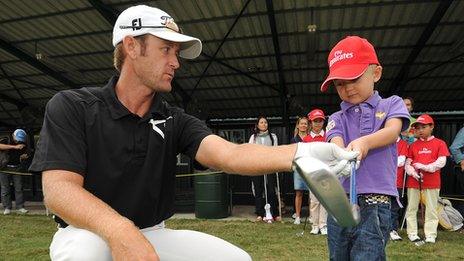Patrick Reed outburst puts spotlight on golf's disciplinary code
- Published
- comments
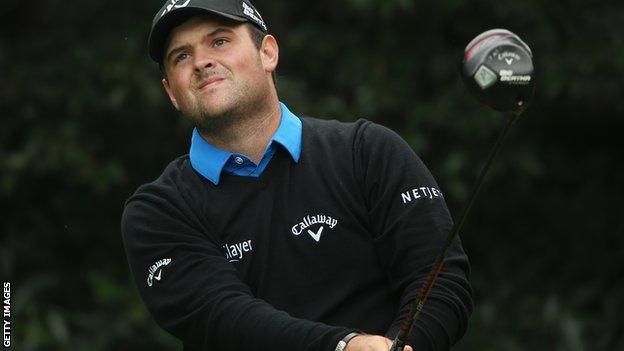
Patrick Reed's outburst happened on the first day of last week's WGC-HSBC Champions tournament
US Ryder Cup star Patrick Reed will be disciplined for his foul-mouthed homophobic outburst that followed three-putting in China last week.
As the 25-year-old has acknowledged, it is quite right that he is punished. There should be no place for this kind of behaviour in the game of golf.
Reed will no doubt be hit with a fine and it was even suggested in some quarters that he might receive a short ban.
So, how much and for how long?
Thanks to a PGA Tour policy that some people within the game believe does golf a huge disservice, these questions will never be publicly answered. Punishments are not publicised other than in instances where a player tests positive for performance-enhancing drugs.
It is a disciplinary code which lacks any kind of meaningful consequence.
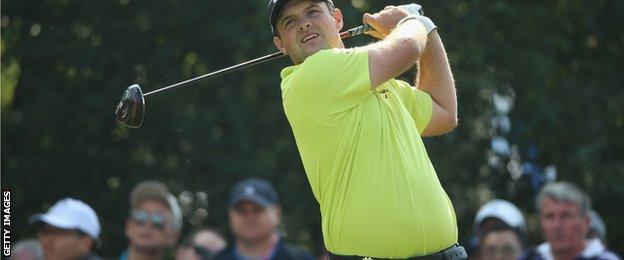
Reed has so far earned more than £2.5m playing on the PGA Tour in 2014
Unpublished fines make no difference to millionaire stars like Reed.
Yet, in this case he is a chastened figure who fronted up with commendable contrition following the incident which occurred on the first day of the WGC-HSBC Champions tournament in Shanghai.
There was no escaping his error of judgement because it was captured by television cameras and attendant microphones. Commentator Frank Nobilo issued an immediate apology for any offence caused.
Reed himself sought out reporters afterwards to issue his own words of regret. It was a much-needed damage-limitation exercise for someone no doubt realising the extent to which his own marketability could be affected.
After all, loss of sponsorship is much harder on players' pockets than most fines handed down from PGA Tour headquarters.
But imagine if Reed's comments were heard only by those people immediately around the green. A bunch of impressionable fans, most probably new to the game, might have been offended but if the cameras were elsewhere no one else would have been any the wiser.
Fines & misdemeanours |
|---|
February 2011: The European Tour announces it has fined Tiger Woods an undisclosed sum for spitting on a green at the Dubai Desert Classic. Woods tweets: "The Euro Tour is right - it was inconsiderate to spit like that and I know better." |
March 2010: Florida court papers reveal former Open and PGA Champion John Daly has been banned five times, handed fines totalling nearly $100,000 (£63,000) and put on probation on six occasions in 18 years as a pro. |
August 2009: On condition of anonymity, a Tour official confirms Tiger Woods is to be fined an undisclosed sum for criticising referee John Paramor after the official put Woods and Padraig Harrington on the clock at the Bridgestone Invitational. |
In those circumstances should Reed be punished? Yes, of course. The crime would have been the same and spectators (no matter how few) would have witnessed a crass lack of professionalism.
Such actions would likely be reported back to the authorities anyway and a fine would be imposed. But the miscreant's reputation would remain in tact to anyone bar immediate eye witnesses.
With no publicity and no shame, where exactly is the deterrent? Why bother with a disciplinary code?
The current set-up is one drafted by a PGA Tour that represents the best interests of its players but, it could be argued, not the sport itself. By keeping punishments in-house, reputations remain intact.
Sponsors want to be associated with a squeaky-clean game and cash will continue to flow into the golfers' bank accounts.
Every other sport lives off sponsorship money but it is hard to think of another that appears to behave with such a focus on its reputation.
With golf about to rejoin the Olympic family,, external it is a game that is surely obliged to rise above its outdated and secretive policy.
Last week we had a tournament in Shanghai without a defending champion. Dustin Johnson's absence from competition, which stretches back to early August, has yet to be fully or satisfactorily explained.
Because of golf's lack of transparency, all we've been told is he has taken "a leave of absence to confront personal challenges".
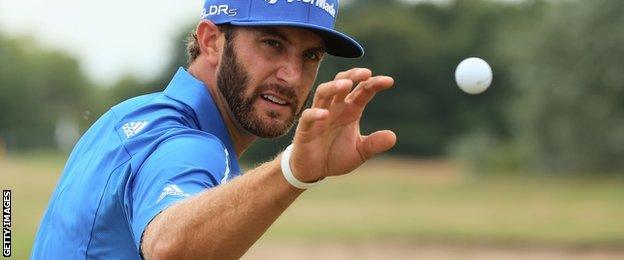
Dustin Johnson's current absence from competition has yet to be fully explained
Now, it could easily be that the big-hitting American has not broken a single rule and his absence may well be entirely voluntary, but how on earth are we supposed to know?
A cloud of suspicion hangs over him, just as it will when another player takes an unexplained but potentially innocent break from the game.
Twelve months ago Johnson was a huge hit in China. The fans who cheered him then deserve to know why he wasn't able to defend his title.
His successor as champion was Bubba Watson, who thrillingly forced his way into a play-off with Tim Clark by holing a bunker shot for eagle on the 72nd hole.
The architect of this drama is no stranger to less endearing moments on the golf course. Like Reed, he is prepared to publicly acknowledge the occasions when he lets down himself and his sport.
And on that subject Watson said: "I love that the media calls me out. I love when my friends call me out. My mom calls me out a lot and I do love it."
These typically folksy, homespun words from the Masters champion provide a simple and serious message. If you step out of line you should be dealt with. Furthermore you should be seen to be dealt with.
Depressingly, this is completely lost on the PGA Tour. In this regard it is a governing body that could be accused of being derelict in its duty to the game.
- Published6 November 2014
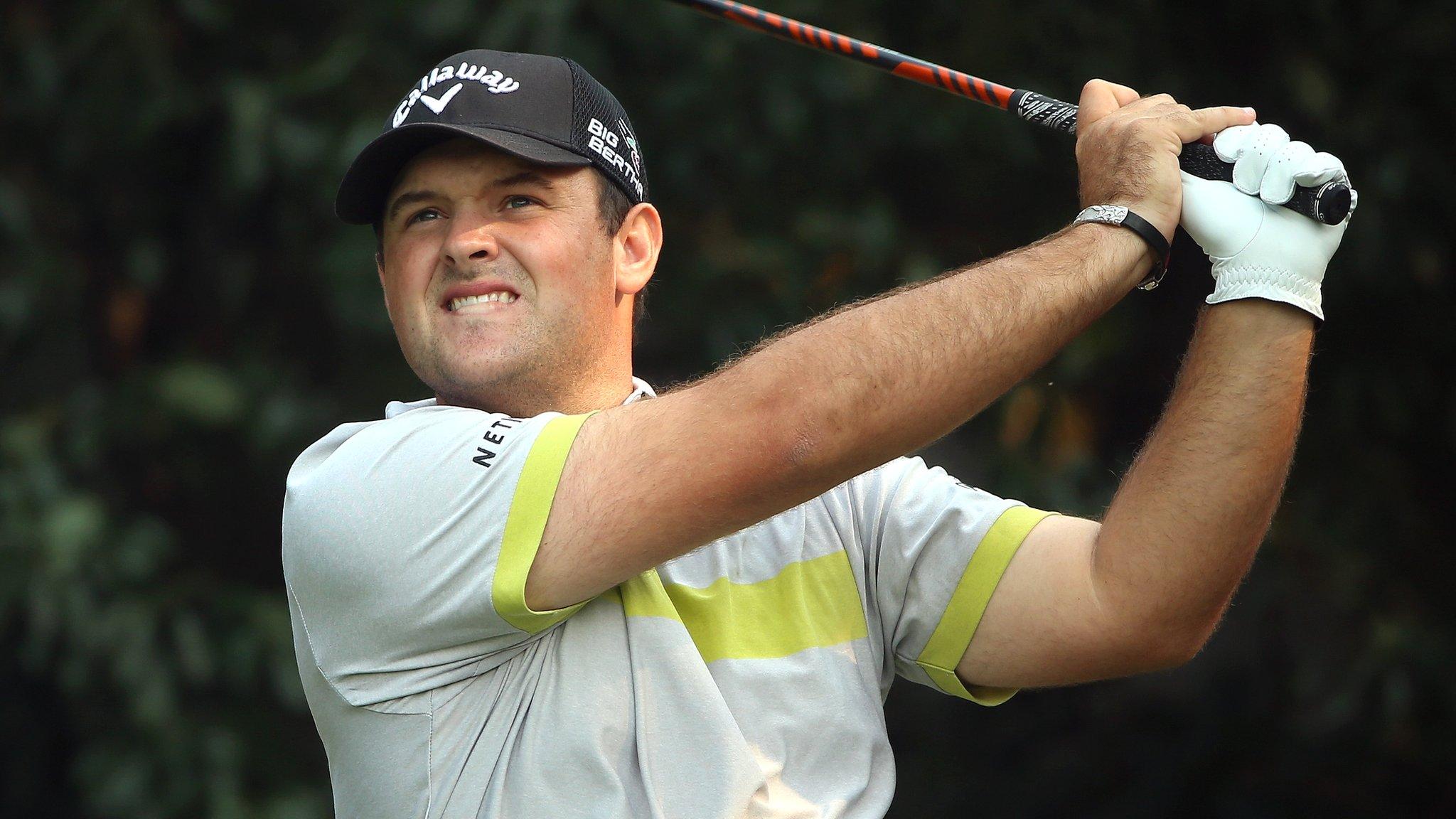
- Published28 September 2018
